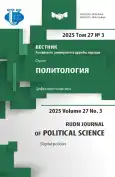The Institution of the State and Public Administration in the Digital Age: Disappearing Phenomenon or Reality?
- Authors: Kochetkov A.P.1, Mamychev A.Y.1
-
Affiliations:
- Lomonosov Moscow State University
- Issue: Vol 27, No 3 (2025): Digital policies
- Pages: 543-559
- Section: DIGITAL SOVEREIGNTY
- URL: https://journal-vniispk.ru/2313-1438/article/view/348835
- DOI: https://doi.org/10.22363/2313-1438-2025-27-3-543-559
- EDN: https://elibrary.ru/NHEMUJ
- ID: 348835
Cite item
Full Text
Abstract
The processes of the development of the institution of the state and public administration face the discrepancies. The authors propose to consider a number of transformational processes that are currently stable and that systematically affect a fundamental change in the social role and purpose of the state and power management activities. The methodological basis of the research is mainly interdisciplinary in nature, since when considering the digitalization of the institute, the state takes as its basis the problem field, rather than disciplinary requirements. The study also used a discourse analysis of analytical and expert materials, scientific research devoted to both general issues of digital transformation of public policy and individual problems of digitalization of public institutions and practices. The study substantiates that the ideas about the formation of a new form of digital domination are based on the socio-political myth of the universality and objectivity of various algorithmic systems, according to which only innovative digital technologies can ensure justice in society, social equality, and eliminate various forms of discrimination and abuse of public power. In conclusion, the paper substantiates the need to develop and complicate the general concept of public authority and its sociotechnical purpose in the digital age. It is proved that the institution of the state will not only be preserved, but its complexity will occur, its sociotechnical purpose will be adjusted, and the role of the latter will increase during the transition to a new technological order.
Keywords
About the authors
Alexander P. Kochetkov
Lomonosov Moscow State University
Author for correspondence.
Email: apkoch@mail.ru
ORCID iD: 0000-0003-4609-0526
Doctor of Philosophy, Professor of the Department of Russian Politics, Faculty of Political Science
Moscow, Russian FederationAlexey Yu. Mamychev
Lomonosov Moscow State University
Email: mamychev@yandex.ru
ORCID iD: 0000-0003-1325-7967
Doctor of Political Science, Professor of the Department of Russian Politics, Head of the Laboratory of Political and Legal Studies, Faculty of Political Science
Moscow, Russian FederationReferences
- Alekseev, N.N. (1998). The Russian people and the state. Moscow: Agraf. (In Russian).
- Altermatt, U. (2000). Ethnonationalism in Europe. Moscow. (In Russian).
- Braidotti, R. (2021). Posthuman. Moscow: Gaidar Institute Publishing House. (In Russian).
- Chirva, D. (2024). The human in a human-machine hybrid of artificial intelligence. Logos, 34(6), 203–216. (In Russian). http://doi.org/10.17323/0869-5377-2024-6-203-214 EDN: LYPEKA
- Chistov, K.V. (1986). Folk traditions and folklore. Essays on theory. Leningrad: Nauka. (In Russian). EDN: YVOOOL
- Furs, S.P. (2022). Analyzing a new social phenomenon — algocracy. Culture and security, 1, 5–9. (In Russian). http://doi.org/10.25257/KB.2022.1.5-9 EDN: BMSFUF
- Greenfield, A. (2018). Radical technologies. The device of everyday life. Moscow: Delo Publishing house. (In Russian).
- Habermas, J. (2008). The Split West. Moscow. (In Russian).
- Heymans, J., & Timms, G. (2019). The New Power: what forces control the world — and how to make them work for us. Moscow: Alpina Publisher. (In Russian).
- Khudyakov, P.A. (2021). Improving the legal model of taxation in business restructuring of IT companies. Legal Science, 12, 49–55. (In Russian). EDN: GFHKGS
- Kochetkov, A.P., & Mamychev, A.Yu. (2024). The digital elite: Formation and development trends. Polis. Political Studies, 33(4), 135–145. (In Russian). http://doi.org/10.17976/jpps/2024.04.10 EDN: CQFELT
- Mamychev, A.Yu. (2025). State power in the socio-cultural organization of modern society: Theoretical and methodological aspects of political and legal transformation. Moscow: RIOR: INFRA-M. (In Russian).
- Markus, G. (2024). The big deception of big language models. A new approach to AI and regulation of technology giants. Yerevan: Fortis Press. (In Russian).
- Ocheretyaniy, K., & Pogrebnyak, A. (2024). After algorithms. From social utopias to the fantasy of comfort. Logos, 34(6), 1–8. (In Russian). http://doi.org/10.17323/0869-5377-2024-6-1-7 EDN: AHDMFC
- Sabo, I. (1974). Fundamentals of the theory of law. Moscow. (In Russian).
- Schmitt, K. (2010). The state and the political form. Moscow: HSE Publishing House (In Russian). EDN: QRNQGL
- Solovyov, A.I. (2011). Latent structures of government or the play of shadows on the face of power. Polis. Political studies, 20(5), 70–98. (In Russian). EDN: OHRWPJ
- Vitchenko, A.M. (1982). Theoretical problems of state power research. Saratov. (In Russian).
- Yakunin, V.I., Volodenkov, S.V., Bagdasaryan, V.E., & Vilisov, M.V. (2024). State policy as an object of modern scientific research. Bulletin of the Moscow State University. Series 12. Political sciences, 6, 50–94. (In Russian). http://doi.org/10.55959/MSU0868-4871-12-2024-2-6-50-94 EDN: LJMALN
- Zuboff, S. (2025). Supervisory capitalism or democracy? Moscow: Gaidar Institute Publishing House. (In Russian).
Supplementary files









